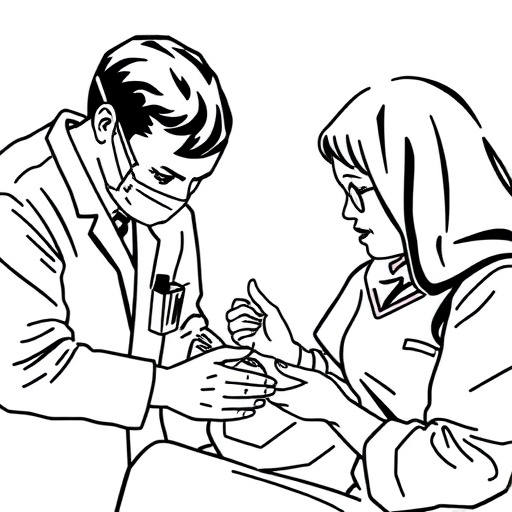In a groundbreaking initiative set to redefine the landscape of neonatal medicine, a recent commission article published in Pediatric Research calls for a transformative enhancement of interprofessional collaborations within neonatology. Authored by leading experts Abman, Modi, and De Luca, this visionary paper explicates a comprehensive framework aimed at optimizing outcomes for the most vulnerable patient population—newborns—through strengthened interdisciplinary synergies spanning various healthcare disciplines.
Neonatology, a specialized field dedicated to the care of newborn infants especially those born premature or with critical illnesses, often demands intricate and coordinated medical interventions. The authors articulate how fragmented care models, characterized by siloed expertise and limited communication between specialties such as neonatology, nursing, respiratory therapy, nutrition, and social services, may impede holistic patient care. They advocate for integrative strategies that recognize the unique contributions of each professional while fostering seamless interactions.
Underlying the commission’s perspective is a dynamic vision: creating integrated care systems where pediatricians, nurses, therapists, developmental specialists, and families collaborate in real-time, guided by shared goals and data-driven decision-making. This paradigm shift is fueled by evidence suggesting that multidisciplinary teams enhance diagnostic accuracy, reduce errors, and improve neurodevelopmental outcomes in neonates. The authors emphasize that such collaboration is not merely additive but synergistic—unlocking new potential beyond individual expertise.
Technological advances are highlighted as pivotal enablers of this collaborative future. The utilization of electronic health records customized for neonatal intensive care units (NICUs), telemedicine platforms connecting scattered specialists, and advanced analytics capable of predicting patient trajectories are presented as essential tools. These innovations are positioned as means to transcend geographical and professional boundaries, allowing expert consultation and coordinated care irrespective of location.
However, the article also tackles substantial challenges impeding interprofessional collaboration. Cultural differences among disciplines, variability in training and communication skills, and systemic barriers such as reimbursement structures and administrative inertia are dissected. The authors call for targeted educational reforms, advocating for interprofessional training modules embedded in graduate and postgraduate curricula to instill collaborative competencies early in professional development.
A notable emphasis is placed on family-centered care reshaped by this collaborative ethos. Recognizing families as integral members of the care team, the authors argue for enhanced communication pathways and participatory decision-making processes. By empowering parents and caregivers, providers may improve adherence, satisfaction, and long-term developmental support, creating a continuum of care that extends beyond hospital discharge.
Furthermore, the commission underscores the necessity of equitable access to neonatology expertise worldwide. Disparities in resources and specialist availability disproportionately impact low- and middle-income countries, stressing the urgency of scalable, collaborative models and capacity-building initiatives. The authors envision leveraging global networks and digital platforms to disseminate best practices and democratize access to lifesaving neonatal care innovations.
Another critical component of the proposed framework is research collaboration across disciplines. The authors propose integrated research consortia that bring together clinicians, basic scientists, epidemiologists, and data scientists to address pressing questions in neonatal pathophysiology, treatment optimization, and long-term outcomes. Such alliances could catalyze breakthroughs in understanding conditions like bronchopulmonary dysplasia, necrotizing enterocolitis, and brain injury.
The article also delves into ethical dimensions intertwined with neonatology’s collaborative future. Decision-making in neonatal intensive care often involves prognostic uncertainty, complex risk-benefit assessments, and delicate considerations of quality of life. Effective interdisciplinary dialogue and inclusion of ethics experts are posited as mechanisms to navigate these challenges compassionately and transparently.
To operationalize this vision, the authors suggest policy reforms incentivizing collaborative care models, such as bundled payments and quality metrics aligned with team-based outcomes. Institutional leadership is called upon to foster cultures that value and reward interprofessional collaboration, ensuring infrastructure and support systems sustain sustainable improvements.
Importantly, the article presents a roadmap for implementing these changes incrementally, recognizing that transformative shifts require patience, adaptability, and continuous learning. Pilot projects, feedback mechanisms, and ongoing evaluation are proposed as essential elements to refine collaborative models and tailor them to diverse clinical settings.
The psychological and professional well-being of healthcare providers also receives attention. The burdens of caregiving in NICUs are immense, and the authors highlight that support systems emerging from collaborative communities can mitigate burnout and compassion fatigue, ultimately enhancing provider retention and performance.
From a systems engineering perspective, the commission endorses principles of human factors and design thinking to redesign workflows and communication channels within NICUs. Structured huddles, standardized protocols co-created by multidisciplinary teams, and real-time data dashboards are proffered as practical interventions to streamline team interactions and patient management.
The article concludes with a clarion call for the global neonatology community to embrace this cultural evolution. The future of neonatal care, as envisioned by Abman and colleagues, is one where synergy supersedes isolation, innovation rides the crest of collaboration, and the collective strength of diverse professionals incubates better beginnings for the smallest and most fragile lives.
This heralded commission paper not only delineates a strategic pathway but ignites a movement—one that challenges entrenched paradigms and inspires a reimagining of neonatology’s potential, driven by interprofessional unity and shared mission. As neonatal care enters this new chapter, the prospects for improved survival, development, and quality of life for newborns are profoundly promising, capturing the attention of clinicians, researchers, policymakers, and families alike.
Subject of Research: Neonatology, interprofessional collaboration, neonatal intensive care.
Article Title: The Lancet Commission on the Future of Neonatology: A Call to Enhance Interprofessional Collaborations.
Article References:
Abman, S.H., Modi, N. & De Luca, D. The lancet commission on the future of neonatology: a call to enhance interprofessional collaborations. Pediatr Res (2025). https://doi.org/10.1038/s41390-025-04486-z
Image Credits: AI Generated
DOI: https://doi.org/10.1038/s41390-025-04486-z
Tags: challenges in neonatal carecollaborative healthcare strategiesenhancing communication in healthcareevidence-based practices in neonatologyfuture of neonatologyholistic patient care for infantsimproving neonatal diagnostic accuracyintegrated care systems for newbornsinterprofessional collaboration in healthcaremultidisciplinary teams in medicineoptimizing neonatal outcomestransforming neonatal medicine practices





